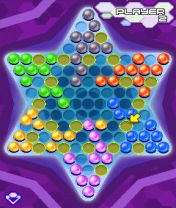
Chess, poker and sudoku are all regularly converted into mobile games, but Chinese Checkers has been a little overlooked up until now.
It's an obvious choice for conversion though. After all, no one wants to be carrying a checkers board and all those little pins around with them.
It also lends itself to different styles of play for either a single player, a single player against the computer or several people - up to six using the game's Hot Seat or Bluetooth modes.
Clearly it's difficult to funk up (I beg your pardon - ed) a game of checkers, though, and maker Lemonquest doesn't even really try.
The Classic game is played on a simple top-down viewed hexagram board and simply lets each player take his turn to move one of his ten coloured checkers across the board.
The point of Chinese Checkers is for each player to try to get all of his checkers into the opposing star point to the one he started in.
A checker can only move one space generally, although if there are other pieces near to it - either belonging to the same player or an opponent - it can jump them in order to gain ground quicker. This doesn't result in these jumped pieces being taken in the regular game, but it does in Quest mode.
Quest mode is a welcome addition to the Classic game. While the Classic game will pit you against friends or the computer on one of three difficulty levels, Quest is just your brain versus the puzzle.
This puzzle is to land a piece on the green space indicated by hopping over the other pieces on the board. However, once you jump a piece, it disappears, and once all the pieces are gone you can no longer move, so every move requires some forethought and planning.
This is pretty much all there is to the mobile game, although there is one other option given before the start of either type of game and that is whether you want to play with 'classic' visuals or with 'lady checkers'.
Strangely, the latter turns your checkers into ladies, who jump out of their places on the board when highlighted and fire off a couple of hearts after every move.
It's a pointless feature, but we'll grudgingly concede it makes the board look a bit more interesting.
In terms of functionality, Chinese Checkers does a perfectly good job of delivering the experience to mobile phone. The computer controlled AI is fairly fierce - Easy mode will be fine to start with for pretty much everyone who's not a checkers champion - but rather that than too easy.
What does make the game easier is the fact the spaces where your currently highlighted checker can be moved are shown for you, and it doesn't appear to be possible to turn this facility off.
This takes a lot of the skill out of discovering the best moves to make, since you're obviously going to choose the best one based on what the game has automatically shown you.
It's difficult to get too overexcited about a checkers game, but Chinese Checkers is a decent conversion for those after checkers on their phone.
Quest mode is addictive and lengthy, the tunes that accompany the game are pleasant and relaxing and there's a decent selection of multiplayer and AI-controlled modes. It is what it is though, and nothing more than that.
Chinese Checkers

